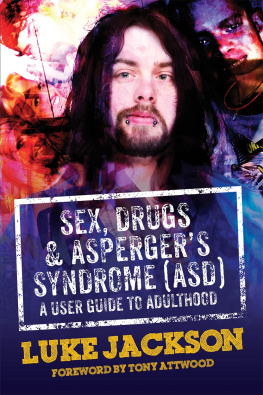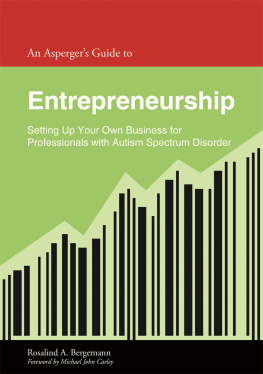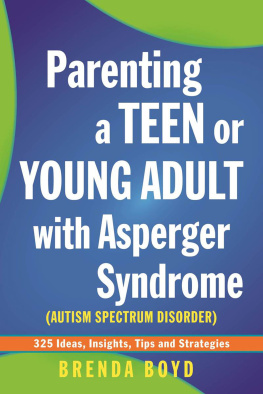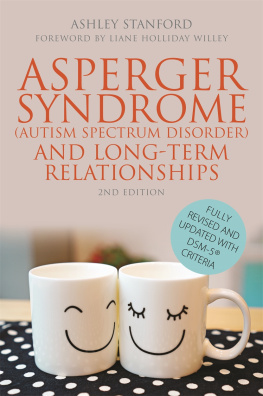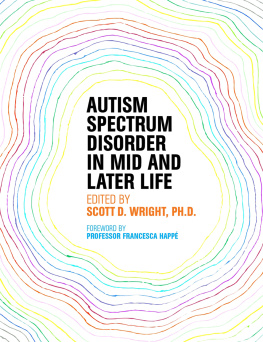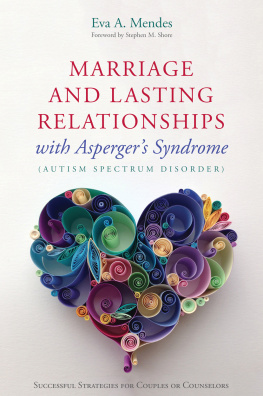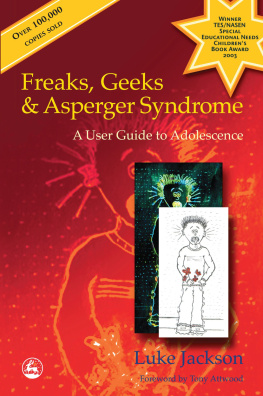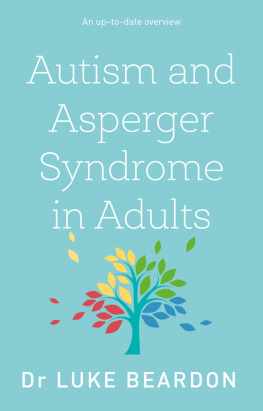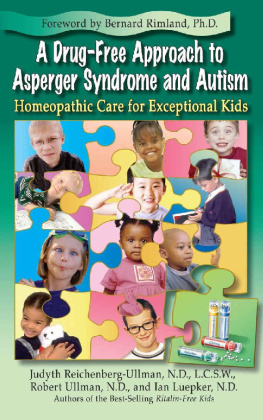
Sex, Drugs and Aspergers Syndrome (ASD)
by the same author
Freaks, Geeks and Asperger Syndrome
A User Guide to Adolescence
ISBN 978 1 84310 098 0
eISBN 978 1 84642 356 7
Crystalline Lifetime
Fragments of Asperger Syndrome
ISBN 978 1 84310 443 8
eISBN 978 1 84642 534 9
A User Guide to the GF/CF Diet for Autism, Asperger Syndrome and AD/HD
ISBN 978 1 84310 055 3
eISBN 978 1 84642 309 3
Sex, Drugs and
Aspergers Syndrome
(ASD)
A User Guide to Adulthood
LUKE JACKSON
Foreword by Tony Attwood

Jessica Kingsley Publishers
London and Philadelphia
First published in 2016
by Jessica Kingsley Publishers
73 Collier Street
London N1 9BE, UK
and
400 Market Street, Suite 400
Philadelphia, PA 19106, USA
www.jkp.com
Copyright Luke Jackson 2016
Foreword copyright Tony Attwood 2016
Front cover image source: Luke Jackson.
All rights reserved. No part of this publication may be reproduced in any material form (including photocopying or storing it in any medium by electronic means and whether or not transiently or incidentally to some other use of this publication) without the written permission of the copyright owner except in accordance with the provisions of the Copyright, Designs and Patents Act 1988 or under the terms of a licence issued by the Copyright Licensing Agency Ltd, Saffron House, 610 Kirby Street, London EC1N 8TS. Applications for the copyright owners written permission to reproduce any part of this publication should be addressed to the publisher.
Warning: The doing of an unauthorised act in relation to a copyright work may result in both a civil claim for damages and criminal prosecution.
Library of Congress Cataloging in Publication Data
Names: Jackson, Luke, 1988- author.
Title: Sex, drugs and Aspergers syndrome (ASD) : a user guide to adulthood /
Luke Jackson ; foreword by Tony Attwood.
Description: Philadelphia : Jessica Kingsley Publishers, 2016. | Includes
index.
Identifiers: LCCN 2015027315 | ISBN 9781849056458 (alk. paper)
Subjects: LCSH: Jackson, Luke, 1988---Mental health. | Aspergers
syndrome--Patients--Family relationships. | Autistic youth--Life skills
guides.
Classification: LCC RJ506.A9 J3264 2016 | DDC 618.92/858832--dc23 LC record available at http://lccn.loc.gov/2015027315
British Library Cataloguing in Publication Data
A CIP catalogue record for this book is available from the British Library
ISBN 978 1 84905 645 8
eISBN 978 1 78450 139 6
Contents
Foreword
Those who have read Freaks, Geeks and Aspergers Syndrome may have wondered what happened to Luke during his later teenage years and in his early twenties, and those who have not read his first book may be wondering, Who is Luke Jackson? Luke is a brave and eloquent young man who has Aspergers Syndrome, and his autobiographical sequel describes his experiences, reflections and wisdom as he matures from a young teenager into an adult. Luke has become a mentor to those who have Aspergers Syndrome, as well as their parents and other family members. His insights and practical suggestions will also be valued by psychologists who specialise in teenagers and young adults with an autism spectrum disorder (ASD).
Luke describes his recent experiences in a wide range of areas: sensory sensitivity, mental health and especially depression, peer pressure and socialising, being bullied, drugs and addiction, and intimate relationships. The title of his book is perhaps provocative, but the themes are very important to those who have Aspergers Syndrome.
Clinicians and academics are only just starting to appreciate and evaluate the sensory processing profile of those who have an ASD. However, we do know that this characteristic causes considerable distress and that sensory sensitivity tends to be a life-long concern. Fortunately, clinical experience and autobiographies suggest that adults with an ASD have opportunities that they did not have as children to create and maintain an environment and lifestyle that minimises the circumstances that engender aversive sensory experiences. Greater maturity also enables the person to temporarily endure the sensations, rather than yielding to the irresistible urge to escape from them.
Those who do not have an ASD may assume that repeated exposure over many years to an unpleasant sensory experience will eventually achieve habituation, such that the experience is perceived as less intense. They may also advise just trying to ignore the sensation. However, repeated exposure, even over decades, rarely leads to habituation, and it is almost impossible for those who have an ASD to ignore the sensation or find a distracting activity. The person with an ASD needs compassion and cooperation to help either avoid, or momentarily tolerate, intensely aversive sensory experiences. Luke describes sensory sensitivity as occurring throughout the sensory system, from auditory to somatosensory, and the effects of such sensitivity on everyday life.
We know that there is an association between ASD and mental health issues, especially anxiety disorders and depression. Luke focuses primarily on depression, which has occurred regularly throughout his life. There are many reasons why those who have an ASD are more vulnerable to feeling sad and depressed. These include intense feelings of social isolation, alienation and loneliness, self-esteem being based on the criticisms, rather than compliments, of peers, the mental and emotional exhaustion from socialising, coping with change and the unexpected, and difficulties with the organisational aspects of life. There can also be a cognitive style that over-focuses on what could go wrong, or on making a mistake, which leads to a pessimistic outlook on life. Another potential cause of depression is the perception of a diagnosis of Aspergers Syndrome as a disability rather than a difference, and a self-perception of being irreparably defective and eternally socially stupid.
Unfortunately, there are also characteristics of ASD that can prolong the duration and increase the intensity of depression. People who have an ASD have considerable difficulty conceptualising and disclosing in conversation with others their inner thoughts and feelings, preferring to retreat into silent solitude and resolve the feelings of sadness or despair by subjective thought. They may use their special interest as a thought blocker, and as a source of pleasure and restoration of energy that has been depleted throughout the day. Other people are better at articulating and disclosing their feelings to each other. They know that another person can provide a more objective opinion and validation of emotions, and can cheer them up by reassurance and words and gestures of affection or compassion. Family members and friends can provide distraction by initiating enjoyable social experiences, or using humour. In contrast, those who have an ASD can have considerable difficulty resonating with, or being infused by, the happiness of others, and may not perceive social experiences as an antidote to feelings of depression. Indeed, social interactions may reinforce their reasons for feeling depressed by being a reminder of their social clumsiness and confusion. Lukes descriptions of and insight into the area of mental health will be comforting for those who have an ASD, but his advice will also have more credibility, as he has shared their experiences and thoughts.
Peer pressure is an important aspect of late adolescence and Luke describes the various types of peer pressure and strategies to resist encouragement to engage in activities that are unwise and even dangerous. He also describes his experiences as a young adult going out in a group in the evening. Parents are often concerned how their son or daughter with an ASD will be perceived by others, perhaps as a source of malicious fun or worse. The young adult with an ASD is often very brave in wanting to achieve a social life and make new friends, but when this goes wrong or seems unachievable, it is easy to understand how it becomes one of the reasons for remaining a hermit at home.
Next page
